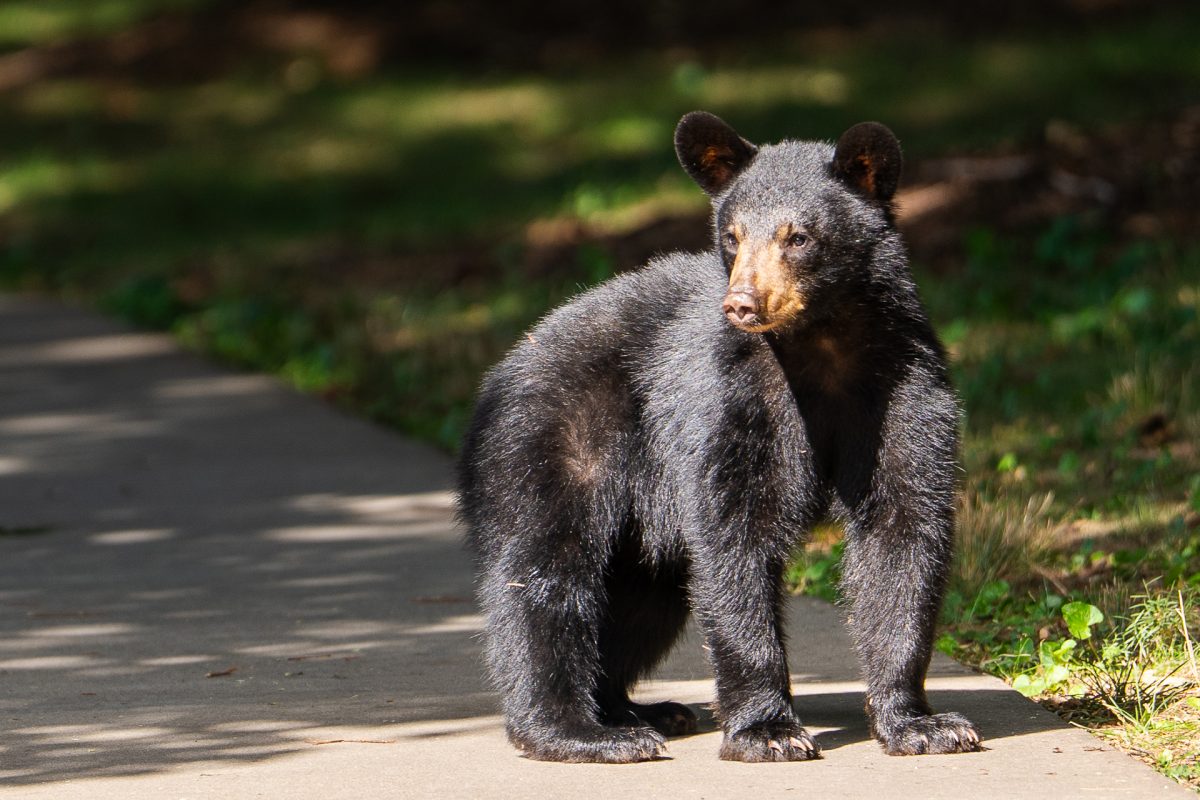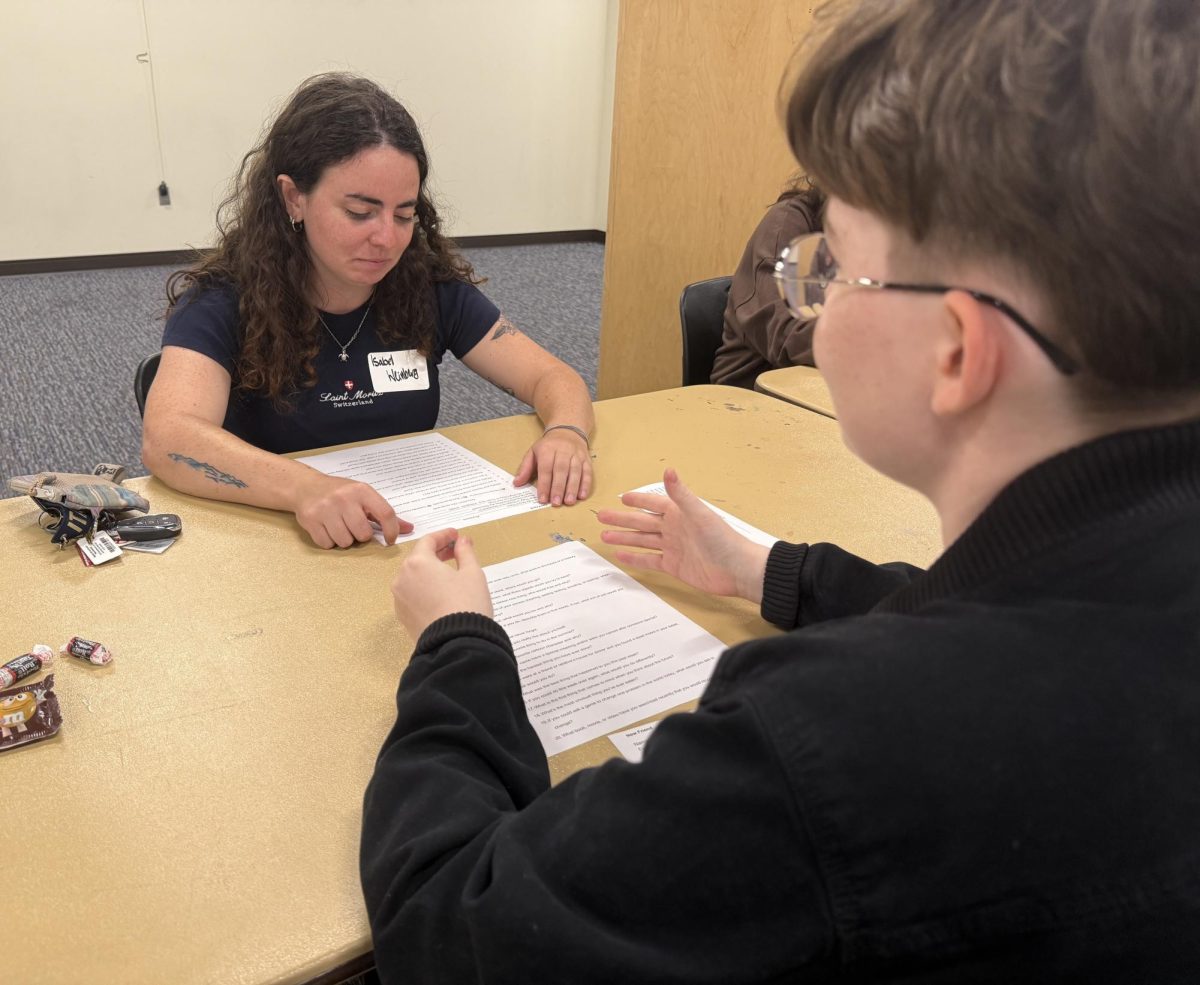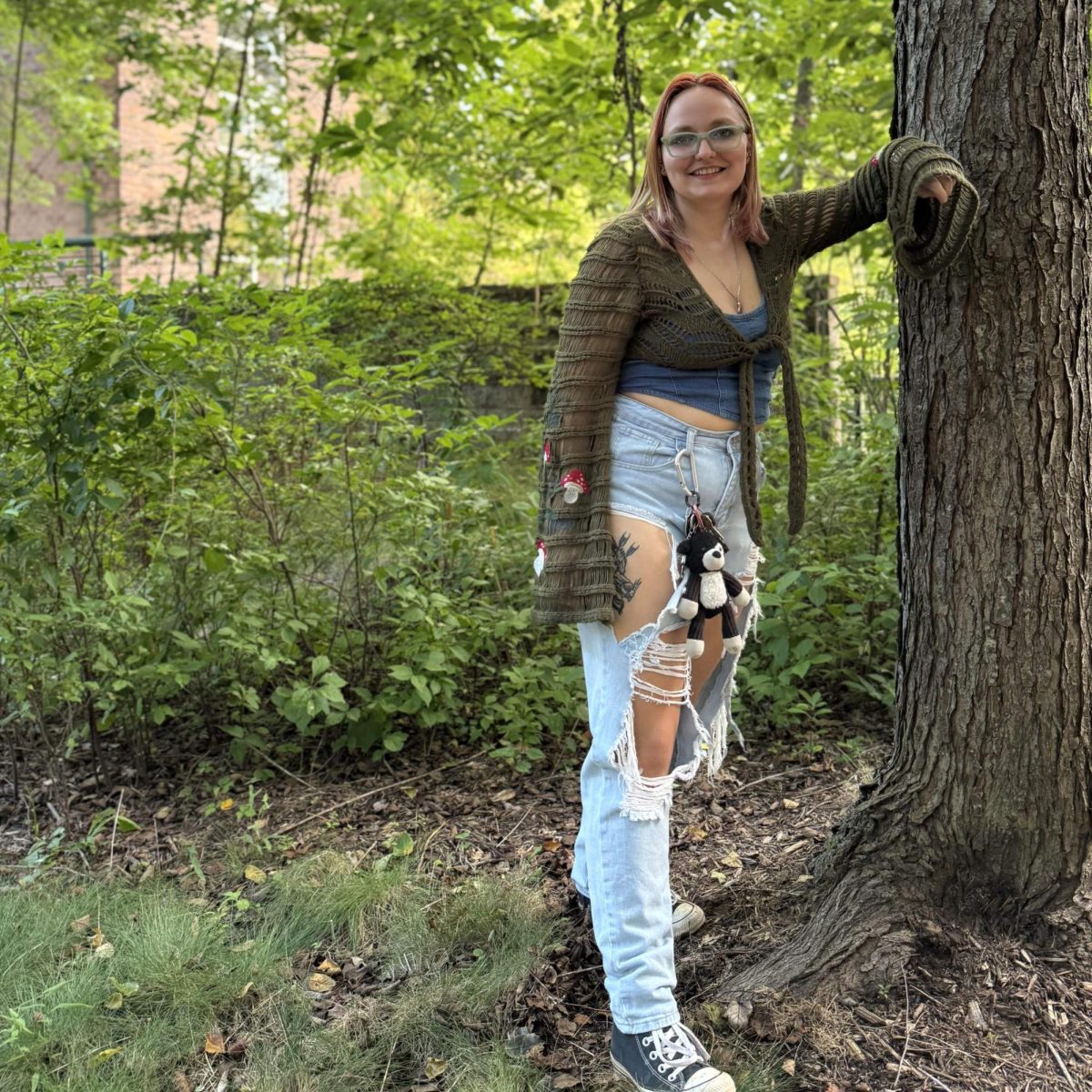Brailey Sheridan
News Editor

Each day, Lola Stephens spends some time doing a mindful practice, not just to take care of her body, but to heal it.
“I fell in love. It was like yoga and meditation were my medicine. I would wake up every morning and I couldn’t go on with my day without starting a meditation. I feel like if more of the Black community knew the power of just meditation and mindfulness and gratitude and yoga, we could definitely take care of ourselves so we can fight this movement even harder,” Stephens said.
Dealing with anxiety and depression, Stephens found meditation and yoga at 16 or 17 years old, she said.
“Life was just awful and it wasn’t until I was so miserable that I was miserable at myself for being so miserable that I was like, ‘I need to do something,’” she said. “I wasn’t really messing with the antidepressants. I didn’t like going outside for walks and stuff. There was this moment where my mom was like, ‘OK, come to this hot yoga class with me,’ and I was like, ‘OK, I’ll try it.’ It was challenging but it felt so good just to move my body and to sweat and to be in a room where I felt like I wasn’t being judged for doing our practice like this.”
The lack of judgment compelled Stephens to come back again and again, she said. One hot yoga session turned into a passion for movement and healing.
“That really helped me when I was in the deepest moments mentally. I really sought it out. I started going continuously after that with my mom, with my sisters, by myself, with my friends. I really made it into a daily ritual, a practice that I needed that was like my medicine
because I was so down in the dumps, I needed to find something, some alternative because nothing was working,” Stephens said.
Black representation in yoga
During the summer of 2019, Stephens trained and became a certified yoga instructor through a one month intensive in Georgia. During that time, she stayed with her grandma, practiced yoga and met new people everyday.
Now a sophomore at UNC Asheville, Stephens continues her practice at Asheville Community Yoga and UNCA as the university’s only Black yoga instructor. Despite feeling welcomed by the yoga community, Stephens still notices a lack of Black instructors and practitioners.
“I usually practice at Asheville Community Yoga. I’ll shout them out. They’re awesome. But it’s Asheville community yoga and it does feel like a community, but minus the fact that I’m usually the only person of color there. I can recognize that it’s something that I’ll never not recognize. It doesn’t always make me feel unwelcome. It doesn’t always make me feel uncomfortable, but it’s something that I recognize every time,” she said. “Why are there no Black yoga teachers there? There are Black yoga teachers seekingj obs here in Asheville.”
According to Stephens, representation matters when it comes to the Black community’s involvement in fitness and mindfulness because stigma keeps people away. The presence of Black instructors in the predominantly white space makes BIPOC feel more comfortable when practicing, she said.
“I’ve been able to see how Black people, like all people of color, their health and racism go hand in hand,” Stephens said. “All these racial disparities are everywhere, I can see that just from the lack of education. It’s the education that needs to be spread and I’m so happy that I can get to be a health and wellness major and to do my doula training and practice yoga so I can continue to help my community and uplift my community in ways where there’s this lack of representation completely. I want to be the Black yoga teacher on campus so people know that Black people practice yoga and meditation. I want to be a Black doula because a young Black woman can be a doula. It’s not just a little white hippie thing,” she said.
According to Rochelle Brandon, a fellow of The American Congress of Obstetricians and Gynecologists and principal of Brandon Gynecology Associates in Charlotte, quality care depends on rapport, meaning most people seek out people who look like themselves in health care spaces.
“Quality health care depends on communication and understanding. When we’re sick and when we’re seeking care, it helps to have somebody who is familiar with your culture and your background. It needs to be culturally appropriate communication. One level of that is seeking out somebody who you think you may have a rapport with, and for a lot of African-American women, that’s another African-American woman,” Brandon said.
By being a Black woman in yoga, Stephens said she hopes to build that rapport with others to encourage them to join her, utilizing yoga, not just as a practice, but a lifestyle that promotes healing.
“It’s so needed that the Black community finds time to heal, finds time for mindfulness and gratitude everyday and finds time for proper education. Seeking out how to get into yoga, how to get into meditation because it seems so foreign. It’s really available for everyone at all times. That’s my message, that you can really practice yoga and I promise you, it will change your life,” Stephens said. It’s really about just breathing, connecting to your spirit, mind and body and just flowing in whatever manner feels so good intuitively. I just want to tell the world that because a lot of people are scared to practice yoga, but it’s a way just to tap into that parasympathetic nervous system and release that stress and trauma and find that peace.”
Yoga as racial justice work
This summer, following the murder of George Floyd by Minneanoplis Police Officer Derek Chauvin, Stephens realized yoga and meditation’s capacity to promote racial healing as she used the practices to curb some of the pain and anxiety triggered by the continued racism against BIPOC in America.
“This was just so fresh and raw, and my initial reaction was like, ‘How can I aid myself? What do I need right now in this moment so I’m not so deep in the dumps?’ and so I was like, ‘I need to meditate. I need to sit down and meditate. I need to go outside and go for a walk. I need to practice some yoga,’” Stephens said. “I was like, ‘If that helps me, I’m sure it’s going to help a lot of other people,’ and by other people, I mean my brothers and sisters, my aunties and uncles, like my black community. So in Charlotte that same week I planned a yoga for racial trauma on Zoom.”
According to Stephens, while yoga won’t simply fix the systemic racism BIPOC face, it gives them an outlet to release the generational trauma caused by it and enables them to persist in the fight.
“It goes down generations and seeing my mom and grandma practice yoga, it almost makes me cry because so many people just keep clinging tight to this trauma and the stress and just pass it down the line and they don’t know how to release their stress in healthy ways, but I’m just so grateful that I have this practice and I can just plant seeds in other people’s minds,” Stephens said.
After her initial Zoom call, Stephens went on to plan vigils and other healing practices alongside Black organizers in Charlotte and Asheville.
“It’s sad that I have to be there and do this work, but it’s kind of exhilarating in a sense, it brings me this kind of a static, like sober high. I’m in a position where I’m anxious, like my nerves are running. There’s lots of people usually and it makes me feel proud. Like this is something that I’m sure someone else is going to remember and I’m going to remember, too,” she said.
By using her passions for yoga and meditation as a tool for racial healing, Stephens said she lives out her desire to dismantle oppressive systems within herself and her community.
“It brings me this sense of excitement, knowing that I’m aiding to the movement,” Stephens said. “I’m doing something to live out the words that I speak, you know? Because a lot of people don’t live out. The words they speak, they say that they want change to happen. They say that they’re tired of living the same old routine of just blatant racism and discrimination and everything, but what are you doing? What are you doing to be the change that you want to see?”
Alongside leading yoga for racial trauma this summer, Stephens started a small jewelry business called Fairy Beads to raise funds for Black organizers. She worked with a friend to make and sell bracelets, necklaces and rings for $5 each. Within the first week, they’d raised almost $500 a piece.
“It was during quarantine, I wasn’t working. I had no money to donate. I didn’t get to donate to anyone before I started making the Fairy Beads,” Stephens said.
Now eight months later, Stephens continues to make jewelry and has donated more than $1,000.
“When we started making them we had no idea that that many people were going to want $5 necklaces. I would make them literally every day from the second I woke up. I would make some in the morning, take a break, make them by the pool. I took them to all my vacations in Savannah,” she said. “I could have stopped. I was like, ‘Should I still make them in college,’ because it does take up a lot of time but it’s a mindful activity, one, so I would do it regardless, then, two, I can give back and, three, people were still asking me for them and if they could buy them. I was like, ‘If people still want them, why not keep it up?”
By raising money for racial justice and leading Black folks through yoga and meditation, Stephens said she’s able to contribute to the Black Lives Matter movement in a sustainable way and hopes her work encourages others to do the same.
“I just think it’s so important. The work I do, it’s something that I feel is kind of unique. You don’t see, you don’t meet many Black yoga teachers who are at the same time fighting for racial justice. I can recognize that. It’s hard work. I wish that more white people would too,” Stephens said. “I don’t try to take up too much space, but just offer the help, offer to see what they need, uplift each other, share their posts and all that.”
Uplifting Black women through trauma healing
This summer, Black and queer women and non-men took the lead in organizing Black Lives Matter protests in Asheville. This gendered divide illuminates the ways gender socialization plays a role in who shows up for social justice work, according to UNCA Professor of Sociology Lyndi Hewitt.
Most women and non-men continue to be socialized to perform in nurturing and caretaking roles. This can translate
to their increased involvement in social justice work and organizing, Hewitt said.
“Care work of all kinds is feminized, and that has always been the case. Social justice work can be considered a kind of ‘caring for the world,’ so it’s not necessarily surprising to see women, and particularly Black women and other women of color, doing some of the most important organizing. These behaviors are not necessarily expected of men,” Hewitt said.
Despite the emotionally taxing nature of this work, Black women continue to do it because it needs to be done, according to Community Organizer and Student Body President London Newton.
“Historically, Black women, in society and in our family structures, 99 percent of the time are leading. We are pulling everything from scraps and keeping our families together. We are community mutual aid. We’re raising children, we’re breadwinners. So in almost every setting, we’ve been the ones running everything,” Newton said.
Brandon said the sheer amount of
need in Black communities makes it almost impossible to stop this work or say no, no matter how drained or tired Black women may be.
“African-American women aren’t doing all of this to prove that they’re strong. They do it because it needs to be done,” Brandon said. “They’re doing for their kids, they’re doing for the things at work, they’re supporting your coworkers and they’re supportive of their family members and their parents. They’re supportive in doing things at church. You’re doing things for the youth church. They’re participating in church activities. They’re doing things in the community, in the neighborhoods because it needs to be done, not because they are strong. There are less of us, just sheer numbers, there are less of us and the need is so great. I have to monitor myself and remind myself that I can say, ‘No,’ but that’s hard when there’s so much need in the community.”
Due to the ongoing stereotype of the “strong Black woman,” Black women oftentimes perform large amounts of emotional and physical labor with little to no support, except from other Black women, Stephens said.
“Society already has this picture painted that Black women are these strong, independent beings who don’t need help from anybody, which in the core that’s some people, but at the end of the day, like we got each other,” Stephens said. “Who keeps us safe? We keep us safe and that just takes us standing up. It’s sad that it’s always Black women having to take care of Black women.”
By being at the helm of Black Lives Matter organizing, Black women ensure the public attends to both their physical and emotional needs in addition to the needs of Black men, whose racial justice conversations often center on, according to Newton.
“We know it’s going to be Black men who are safe first, like, first they’re going to start saying something about Black men, and then they’re going to consider including Black women and then maybe trans women,” Newton said.
Stephens said the same system that calls Black women strong for performing emotional labor and leading in their communities with little to no help also oppresses them because of their race and gender which showcases a double standard. To dismantle this, she approaches Black women’s liberation through an intersectional lens.
“Breonna Taylor, she needs somebody fighting for her. I realize that that could be me. That could be my sister. It’s scary because it goes back to intersectionality. Being Black in America is scary. Being a Black woman in America is even scarier. Being a Black gay woman in America, being a Black trans woman, it all intersects, it adds on top of each other. So women, we’ve just got to fight for each other and keep looking each other up because, I feel as divine feminine beings, we just have that strength to lead the movement,” Stephens said.
Stephens leads Black women in yoga and meditation to help them heal from this labor and continue fighting for liberation. In the future, she imagines a yoga studio led by Black women for Black women.
“I was in Shavasana today and I was thinking about how I want to create like a Black soul sister yoga community within Asheville. That would be so cool. I love Asheville. I love the vibe. I love the community here, but I really would feel so much more at home if the culture was there. If their representation was there,” she said.
Through creating spaces for Black people to learn about and practice yoga, Stephens said the restorative and healing power of the practice continues to spread into the community and promotes change for future generations, breaking down cycles of generational trauma and creating peace.
“I have a great time leading these meditations, but I’m waiting for the moment when someone can lead me in that meditation, because I so badly need yoga for racial trauma. I so badly need this healing meditation. But as of now, I’m being that change that I want to be and I hope I’m inspiring people to do that too,” Stephens said.






















